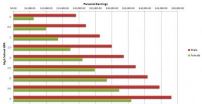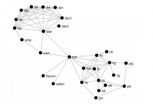(Press-News.org) New research out of New Zealand's world-renowned Dunedin Multidisciplinary Study does not support claims that fluoridating water adversely affects children's mental development and adult IQ.
The researchers were testing the contentious claim that exposure to levels of fluoride used in community water fluoridation is toxic to the developing brain and can cause IQ deficits. Their findings are newly published in the highly respected American Journal of Public Health.
The Dunedin Study has followed nearly all aspects of the health and development of around 1000 people born in Dunedin in 1972-1973 up to age 38.
Lead author Dr Jonathan Broadbent of the University of Otago, New Zealand, says the new research focused on Study members' fluoride exposure during the first five years of their lives, as this is a critical period in brain development, after which IQ is known to be relatively stable.
Dr Broadbent and colleagues compared IQs of Study members who grew up in Dunedin suburbs with and without fluoridated water. Use of fluoride toothpaste and tablets was also taken into account.
They examined average IQ scores between the ages of 7-13 years and at age 38, as well as subtest scores for verbal comprehension, perceptual reasoning, working memory and processing speed. Data on IQ were available for 992 and 942 study members in childhood and adulthood, respectively.
Dr Broadbent says the team controlled for childhood factors associated with IQ variation, such as socio-economic status of parents, birth weight and breastfeeding, and secondary and tertiary educational achievement, which is associated with adult IQ.
"Our analysis showed no significant differences in IQ by fluoride exposure, even before controlling for the other factors that might influence scores. In line with other studies, we found breastfeeding was associated with higher child IQ, and this was regardless of whether children grew up in fluoridated or non-fluoridated areas."
Dr Broadbent says that studies that fluoridation opponents say show that fluoride in water can cause IQ deficits, and which they heavily relied on in city council submissions and hearings, have been reviewed and found to have used poor research methodology and have a high risk of bias.
"In comparison, the Dunedin Multidisciplinary Study is world-renowned for the quality of its data and rigour of its analysis," he says.
"Our findings will hopefully help to put another nail in the coffin of the complete canard that fluoridating water is somehow harmful to children's development. In reality, the total opposite is true, as it helps reduce the tooth decay blighting the childhood of far too many people."
INFORMATION:
This work was supported by the New Zealand Ministry of Education, the New Zealand Department of Health, the New Zealand National Children's Health Research Foundation, US National Institute of Dental and Craniofacial Research Grant R01 DE-015260-01A1, UK Medical Research Council Grant MR/K00381X/1, US National Institute on Aging Grant AG032282, and a programme grant from the Health Research Council (HRC) of New Zealand. The Dunedin Multidisciplinary Health and Development Research Unit is supported by the HRC.
Fluoridating water does not lower IQ: New Zealand research
2014-05-19
ELSE PRESS RELEASES FROM THIS DATE:
Chinese scientists crack the genome of another diploid cotton Gossypium arboreum
2014-05-19
Shenzhen, May 18, 2014---Chinese scientists from Chinese Academy of Agricultural Sciences and BGI successfully deciphered the genome sequence of another diploid cotton-- Gossypium arboreum (AA) after the completed sequencing of G. raimondii (DD) in 2012. G. arboreum, a cultivated cotton, is a putative contributor for the A subgenome of cotton. Its completed genome will play a vital contribution to the future molecular breeding and genetic improvement of cotton and its close relatives. The latest study today was published online in Nature Genetics.
As one of the most ...
The young sperm, poised for greatness
2014-05-19
SALT LAKE CITY— In the body, a skin cell will always be skin, and a heart cell will always be heart. But in the first hours of life, cells in the nascent embryo become totipotent: they have the incredible flexibility to mature into skin, heart, gut, or any type of cell.
It was long assumed that the joining of egg and sperm launched a dramatic change in how and which genes were expressed. Instead, new research shows that totipotency is a step-wise process, manifesting as early as in precursors to sperm, called adult germline stem cells (AGSCs), which reside in the testes. ...
'Smoking gun' evidence for theory that Saturn's collapsing magnetic tail causes auroras
2014-05-19
University of Leicester researchers have captured stunning images of Saturn's auroras as the planet's magnetic field is battered by charged particles from the Sun.
The team's findings provide a "smoking gun" for the theory that Saturn's auroral displays are often caused by the dramatic collapse of its "magnetic tail".
Just like comets, planets such as Saturn and the Earth have a "tail" – known as the magnetotail – that is made up of electrified gas from the Sun and flows out in the planet's wake.
When a particularly strong burst of particles from the Sun hits Saturn, ...
Solar energy prospects are bright for Scotland, experts say
2014-05-19
Installing state-of-the-art solar panels on a quarter of a million roofs could meet one-sixth of Scotland's electricity demands, experts say.
Scientists say the strategy could ease the plight of one in three Scottish households, which currently struggle to provide themselves with adequate heat and hot water.
Researchers, business leaders and public sector experts have contributed to a report which sets out how Scotland could benefit from solar power.
They say harnessing energy from the sun on the roofs of south-facing buildings could have significant economic, ...
Antarctica's ice losses on the rise
2014-05-19
Three years of observations show that the Antarctic ice sheet is now losing 159 billion tonnes of ice each year – twice as much as when it was last surveyed.
A team of scientists from the UK Centre for Polar Observation and Modelling, led by researchers at the University of Leeds, have produced the first complete assessment of Antarctic ice sheet elevation change.
They used measurements collected by the European Space Agency's CryoSat-2 satellite mission, which carries an altimeter specially designed for this task.
In sharp contrast to past altimeter missions, CryoSat-2 ...
Sanofi Pasteur announces favorable Phase II data for investigational C. difficile vaccine
2014-05-19
Boston, United States of America – May 19, 2014 – Sanofi Pasteur, the vaccines division of Sanofi (EURONEXT: SAN and NYSE: SNY), presented Phase II (H-030-012) trial results for an investigational vaccine for the prevention of Clostridium difficile (C. diff) infection (CDI) at the 114th General Meeting of the American Society for Microbiology (ASM). The Phase II trial met its primary objectives, reactions were generally mild and of short duration, and the candidate vaccine generated an immune response against C. diff toxins A and B. These toxins are largely responsible ...
Your high school GPA could affect your income
2014-05-19
Coral Gables, Fla. (May 19, 2014)—A team of researchers led by Michael T. French, professor of health economics at the University of Miami (UM), finds that high school grade point average (GPA) is a strong predictor of future earnings.
The findings, published recently in the Eastern Economic Journal, show that a one-point increase in high school GPA raises annual earnings in adulthood by around 12 percent for men and 14 percent for women.
Although previous studies have found a relationship between higher levels of education and greater earnings, less is known about ...
Keywords hold vocabulary together in memory
2014-05-19
Much like key players in social networks, University of Kansas scientists have found evidence that there are keywords in word networks that hold together groups of words in our memory.
In a study published in the Journal of Memory and Language, Michael Vitevitch, KU professor of psychology, showed that research participants recognized these keywords more quickly and accurately than other words that were like the keywords in many respects except for their position in a network of 20,000 similar-sounding English words that he and colleagues created in 2008.
"If words ...
National heart organizations join to combat the global hypertension epidemic
2014-05-19
NEW YORK, N.Y., May 19, 2014: It's estimated that more than 970 million people have hypertension1 and, globally, the disease is responsible for more than nine million deaths every year, making it one of the leading causes of death worldwide. In an effort to help manage the epidemic, leading scientists from the American Society of Hypertension (ASH), American Heart Association (AHA) and the Centers for Disease Control and Prevention (CDC) convened a joint panel to discuss a global project aiming to improve the treatment and control of hypertension worldwide.
The joint ...
IN-TIME shows equal benefit of home telemonitoring in ICD and CRT-D patients
2014-05-19
Athens, 19 May 2014: Home telemonitoring is equally effective in ICD and CRT-D patients, a subanalysis of the IN-TIME trial has shown. The findings were presented for the first time today at the Heart Failure Congress 2014, held 17-20 May in Athens, Greece. The Congress is the main annual meeting of the Heart Failure Association of the European Society of Cardiology.
The prospective IN-TIME multicentre trial included 664 patients with chronic heart failure, class II or III New York Heart Association (NYHA) symptoms and left ventricular ejection fraction END ...



